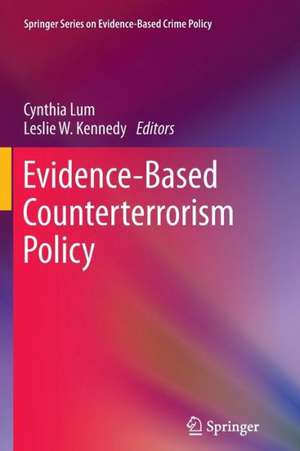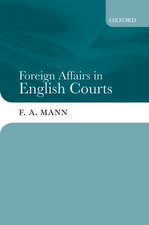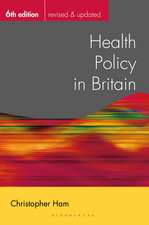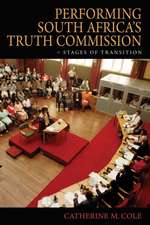Evidence-Based Counterterrorism Policy: Springer Series on Evidence-Based Crime Policy
Editat de Cynthia Lum, Leslie W. Kennedyen Limba Engleză Paperback – 28 ian 2014
Is there evidence that any of these programs are effective – in other words, can they be shown to be linked to reducing terrorism, terrorist recruiting, or to improving the response and management of terrorist events?
Do these interventions have secondary or collateral effects that may be costly, harmful, illegal, beneficial, or otherwise?
As Lum and Kennedy discovered in an evaluation research on counterterrorism interventions, only a minuscule number of empirical studies of terrorism exist and there is an almost complete absence of evaluation research on counter-terrorism strategies. This is startling given the enormous increases in the development and use of counter-terrorism programs, as well as spending on counter-terrorism activity. Even more disconcerting was the nature of the evaluations we did find; some programs were shown to either have no discernible effect on terrorism or lead to increases in terrorism. The emphasis of the need for empirical research in evaluating interventions and informing policy cannot be overstated, and is the primary goal of Evidence-Based Counterterrorism Policy.
| Toate formatele și edițiile | Preț | Express |
|---|---|---|
| Paperback (1) | 645.28 lei 6-8 săpt. | |
| Springer – 28 ian 2014 | 645.28 lei 6-8 săpt. | |
| Hardback (1) | 648.24 lei 6-8 săpt. | |
| Springer – 5 noi 2011 | 648.24 lei 6-8 săpt. |
Preț: 645.28 lei
Preț vechi: 759.15 lei
-15% Nou
Puncte Express: 968
Preț estimativ în valută:
123.49€ • 126.46$ • 102.72£
123.49€ • 126.46$ • 102.72£
Carte tipărită la comandă
Livrare economică 18 martie-01 aprilie
Preluare comenzi: 021 569.72.76
Specificații
ISBN-13: 9781493901111
ISBN-10: 1493901117
Pagini: 396
Ilustrații: VIII, 388 p.
Dimensiuni: 155 x 235 x 21 mm
Greutate: 0.55 kg
Ediția:2012
Editura: Springer
Colecția Springer
Seria Springer Series on Evidence-Based Crime Policy
Locul publicării:New York, NY, United States
ISBN-10: 1493901117
Pagini: 396
Ilustrații: VIII, 388 p.
Dimensiuni: 155 x 235 x 21 mm
Greutate: 0.55 kg
Ediția:2012
Editura: Springer
Colecția Springer
Seria Springer Series on Evidence-Based Crime Policy
Locul publicării:New York, NY, United States
Public țintă
ResearchCuprins
Preface: Evidence-based policy movement.- A. Introduction.- 1. Evidence Based Counter Terrorism Policy: Issues and Prospects.- B. Obtaining Data for Counterterrorism Evaluations.- 2. Generating Evidence – A Review of Projects from the START Center .- 3. Data Archives for Terrorism Research.- 4. The Role of Fusion Centers as Sources of Information .- 5. Data from courts and prisons.- 6. Dynamic Data Analysis and Data Mining.- C. Methodological Concerns in Evaluating Counterterrorism Policy.- 7. Methodological Challenges of Evaluation: The Qualitative Critique of the Campbell Review.- 8. Quantitative Methods in Evaluating Counterterrorism policy.- 9. Longitudinal Methods of Evaluation: Hazard Modeling and Trajectory Analysis.- 10. Alternative Methods of Evaluation – Advanced Events Data Analysis and Simulations
Notă biografică
Cynthia Lum researches in the area of crime prevention, international and domestic policing concerns, democratization and justice, place-based criminology, and research methodology. She has consulted with numerous police agencies in the areas of deployment and crime analysis both in the United States and abroad and also works with the U.S. State Department's International Law Enforcement Academy, where she helps train police commanders from multiple nations. Her recent projects include developing protocols and technologies for tip lines in high-intensity events (funded by the Department of Defense/Department of Justice), conducting a multi-language survey of law enforcement officials across thirty nations, empirically testing social disorganization theory, and conducting a systematic review of research evaluating anti-terrorism strategies.
Leslie W. Kennedy, a Professor at Rutgers University, served as Dean of the Rutgers School of Criminal Justice from 1998 to2007. Dr. Kennedy has published extensively in the areas of fear of crime, victimology, and violence. His current research in public security builds upon his previous work in event analysis and understanding the social contexts in which dangers in society are identified and deterred. Dr. Kennedy is also the Director of the Rutgers Center for the Study of Public Security.
Leslie W. Kennedy, a Professor at Rutgers University, served as Dean of the Rutgers School of Criminal Justice from 1998 to2007. Dr. Kennedy has published extensively in the areas of fear of crime, victimology, and violence. His current research in public security builds upon his previous work in event analysis and understanding the social contexts in which dangers in society are identified and deterred. Dr. Kennedy is also the Director of the Rutgers Center for the Study of Public Security.
Textul de pe ultima copertă
Since the 9/11 terror attacks, the development and implementation of counterterrorism strategies has been a top priority in national security policies in many countries. Yet as the number and scope of these programs grow—with spending to match—few studies have determined whether they are productive, ineffectual, or even detrimental to security. For too many counterterrorism programs, serious steps toward evaluation have yet to be made.
Evidence-Based Counterterrorism Policy emphasizes the use of science, evaluation, and knowledge building to inspire improvements in our what we know about counterterrorism interventions. Focusing on three key areas—identifying and accessing relevant data, using innovative methodologies for generating new interventions, and examining various perspectives to evaluation counterterrorism—the book combines a framework for using scientific findings to inform security policy with a best-practices approach to implementing programs. Strategies such as risk terrain modeling and validity testing for security screening instruments are shown as fostering improvements in threat assessment and in anticipating and responding to future events. The editors also argue for a broader research infrastructure to encourage ongoing development.
Among the topics covered:
· Assessment and comparison of terrorism data sources
· Information sharing and Fusion Centers
· Various longitudinal models for assessing counterterrorism policies and terrorism trends
· Evidence-based evaluations and validity testing of airport security measures
· Public opinion and criminological research application to counterinsurgency and counterterrorism
· Police practices for understanding and managing terror risk
· Counterterrorism finance and trade regulations
· Legal challenges and evaluation of counterterrorism policy
Evidence-Based Counterterrorism Policy is an invaluable resource for researchers in criminology and political science, and for policymakers involved with counterterrorism programs.
Evidence-Based Counterterrorism Policy emphasizes the use of science, evaluation, and knowledge building to inspire improvements in our what we know about counterterrorism interventions. Focusing on three key areas—identifying and accessing relevant data, using innovative methodologies for generating new interventions, and examining various perspectives to evaluation counterterrorism—the book combines a framework for using scientific findings to inform security policy with a best-practices approach to implementing programs. Strategies such as risk terrain modeling and validity testing for security screening instruments are shown as fostering improvements in threat assessment and in anticipating and responding to future events. The editors also argue for a broader research infrastructure to encourage ongoing development.
Among the topics covered:
· Assessment and comparison of terrorism data sources
· Information sharing and Fusion Centers
· Various longitudinal models for assessing counterterrorism policies and terrorism trends
· Evidence-based evaluations and validity testing of airport security measures
· Public opinion and criminological research application to counterinsurgency and counterterrorism
· Police practices for understanding and managing terror risk
· Counterterrorism finance and trade regulations
· Legal challenges and evaluation of counterterrorism policy
Evidence-Based Counterterrorism Policy is an invaluable resource for researchers in criminology and political science, and for policymakers involved with counterterrorism programs.
Caracteristici
Gives an evidence-based analysis of the effectiveness of counterterrorism policies currently in place in the United States. Includes supplementary material: sn.pub/extras




















